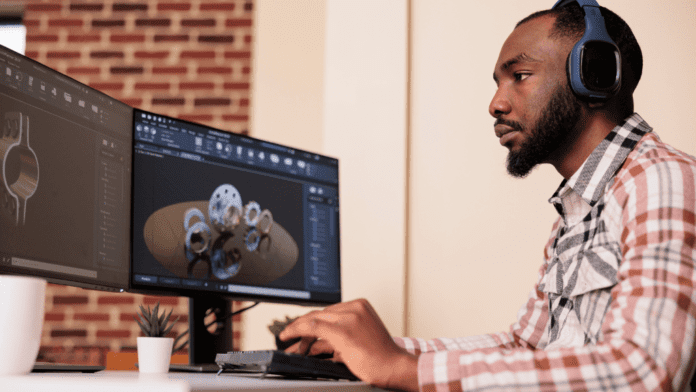The field of mechanical design has changed dramatically since CAD software was introduced. The function of Mechanical Design Engineers is changing rapidly due to technology, and 3D modelling is entering a new phase where it is totally immersive and may be compared to sculpting in virtual space. Engineers are becoming ‘technical artists,’ creating designs in a world without interfaces, and they are no longer restricted to cubicles.
We’ll look into how this fusion of technology and artistry is redefining innovation and creativity in the profession as we examine the future of mechanical design engineering.
What is a Mechanical Design Engineer?
The creation, development, and improvement of mechanical systems, goods, and components is the area of expertise for mechanical design engineers. Their engagement extends all the way from the ideation phase to the level of final product creation. Put simply, they enable the operation of mechanical systems and goods.
Because of this, the function is very diverse. It’s easy to understand why mechanical design engineering is growing in popularity when you consider that mechanical design engineers work in a wide range of sectors, including manufacturing, consumer electronics, renewable energy, aerospace, and automotive.
Mechanical Engineer vs. Mechanical Design Engineer: What’s the Difference?
To put it briefly, mechanical engineers work with all kinds of mechanical devices and systems. Conversely, mechanical design engineers focus only on creating innovative designs. Although they are a subgroup of mechanical engineers, they are experts in the technical and artistic elements of developing mechanical systems and components.
Is it a good career as Mechanical Design Engineers?
Before we answer this, ask yourself if you find solving problems enjoyable and if you think you have a knack for design. A career in mechanical design engineering should be a good fit for you if the answer is yes. However, the engineering community also views it favourably for the following reasons:
- Mechanical design engineers are in high demand in our period.
- You are able to work on a variety of tasks and goods.
- Provides more creative latitude than other technical roles; 4. Allows you to make a real difference
- Learning never stops.
- Get paid a competitive wage.
The evolution from 2D to 3D
The basis of mechanical design is still CAD software, although engineers’ usage of this technology has evolved. The design engineer used to produce technical drawings using 2D wireframe primitives while working in 2D. Then, we witnessed the development of 3D wireframe features in the 1960s. Even though this was a significant turning point, several steps in the procedure were still seen as elementary. For components that might have seemed clear, mechanical design engineers nevertheless had to manually enter limitations, and even a small error might ruin the entire model.
Since then, creative coding and programming have greatly advanced CAD applications. That has greatly increased the variety of CAD programmes and tools accessible, but it also implies that CAD tools have primarily become keyboard-oriented abilities. Although keyboard-based design is widely used in mechanical design, it has certain drawbacks since it requires the designer to possess technical proficiency and understanding of specialised CAD tools, such Solidworks, CATIA, and others. Though there will always be a need for this, freeform mechanical design within the bounds of reality will soon be possible with computers.
Artificial Intelligence
The velocity at which AI is being incorporated into the design process is astounding. Why? Considering that automation technologies have the ability to increase efficiency and production. Artificial Intelligence (AI), often known as robotics or machine learning, may help with simulations and design options. That is not to claim, however, that these sophisticated computer systems can carry out every duty associated with an engineer. Instead, they may automate time-consuming jobs, freeing up Mechanical Design Engineers to work on higher-value projects.
An age of creative engineering
Mechanical design engineers don’t have to, even if they are capable of providing design limitations. Modern technology has ushered in a period of pure creative engineering. Haptics and touchscreen PCs have made mechanical design interfaces more natural. In the future, mechanical design will probably be realised to the fullest extent possible for mechanical design engineers thanks to virtual reality and quantum computing.
Designing a sustainable future
Like other professions, engineering is becoming more and more in demand for assistance with the most critical problems facing our world. Businesses are being pushed to consider how their manufacturing processes affect the environment. As a result, the difficult but gratifying job of creating goods that consume less energy and resources falls to mechanical design engineers. This extends to investigating eco-friendly materials and improving designs for recyclability.
In summary
- The transition from 2D to 3D modelling is an example of how the profession has become more digital.
- AI will support the advancement of engineering
- Design of Mechanisms More creativity can be found in engineers.
- They are actively contributing to the development of a green future.
Interested in pursuing a career in Mechanical Design Engineering? Dive into this exciting field and become part of the future where technology and creativity converge. For more job opportunities and career guidance in mechanical engineering, visit our site. Explore Your Future Here.


